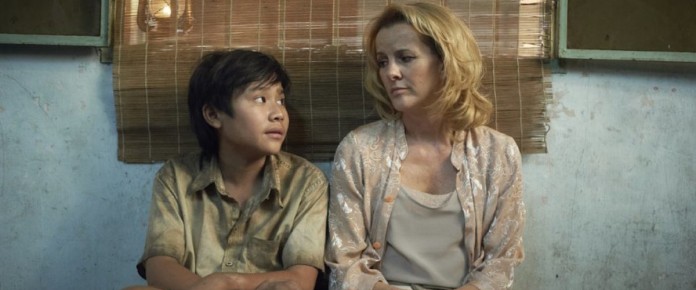So often with biopics we delve into the life of somebody we’re already fully aware of, be it a musician who once wrote a song we hum along to at Christmas, or perhaps the person who invented the machine you’re likely to be reading this review from. But their stories aren’t always the most interesting – whereas Christina Noble, somebody you’re rather unlikely to have ever heard of, has a completely remarkable tale – and it’s been brought to life in Stephen Bradley’s rousing drama.
We first meet Christina when just a young girl (Gloria Cramer Curtis), singing for crowds at bars and pubs in 1950s Ireland, offering a stark contrast to her unhappy life at home, as her mother passes away from an illness, and her father (Liam Cunningham) is deemed not fit enough to raise the young girl and her siblings. She’s then sent off to a convent to be raised, but as a teenager, portrayed at this stage by Sarah Greene, she is raped by a group of men and subsequently impregnated. After her adoring young son is sold to a Catholic family by the nuns, Christina plots her escape, moving to Birmingham with her close friend Joan (Ruth Negga).
Needless to say life continues to be a struggle for this blissfully and contagiously optimistic young woman, which leads us to the 1980s (now portrayed by Deirdre O’Kane), where she’s decided to move to Ho Chi Minh City in Vietnam, only to be completely disillusioned with the quality of life out there, particularly for children. So as somebody who has fought against the odds her entire life, she believes it’s time to instil that same sense of hope in the next generation, and decides it’s on her to make a difference in their lives.
When dealing with a narrative of this magnitude, sometimes it’s better to find one particular strand, a certain time in this woman’s life to use as the focus to the piece. Instead Bradley can accused of attempting to fit too much in, which is overbearing to the viewer. We don’t need to witness her childhood, for instance, we can learn about it through the tale, be it via anecdotes or the recounting of memories, both good and bad. It takes more of a skill to take just one aspect and have it be emblematic of who the subject is and what they stand for – similarly to what Selma achieved, or the recent James Dean biopic Life.
If we were to focus on one particular time in Christina’s life, it would have to be the young adult years, for Greene has a real screen presence, while it’s in this period where we see the majority of the drama unfold. Yet given we’re interweaving between both the past and future, we never have the time to stop and digest what we’re seeing, to take it all in. Christina’s achievements later on in life during her spell in Vietnam may work better as the epilogue at the end of the picture, particularly as such sequences represent the more tedious elements to this film, where Christina takes on the holy persona of Lady Diana, while comparisons between working class Ireland and war-torn, poverty-stricken Vietnam seem somewhat far-fetched.
Nonetheless, in spite of the apprehensions with this approach, Bradley has structured the tale well, as when we do move between eras, it’s done so in a seamless manner and with a minimum contrivance. Still, if wanting to watch a film about a young girl growing up in 1950s Ireland wanting to leave home for pastures new, our advice is to go for Brooklyn, which is the far more accomplished, compelling piece of cinema.











